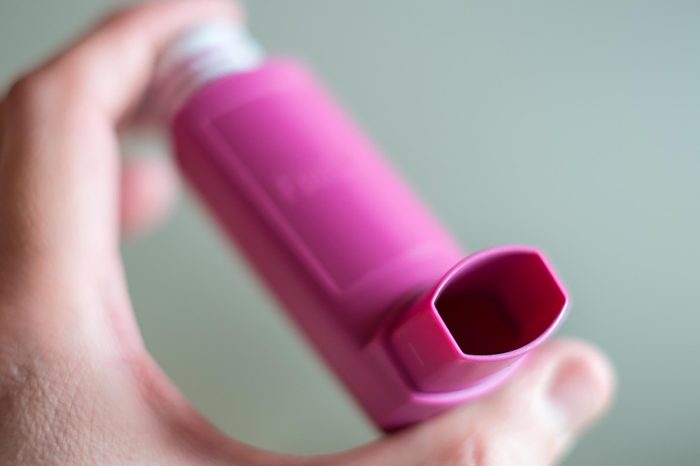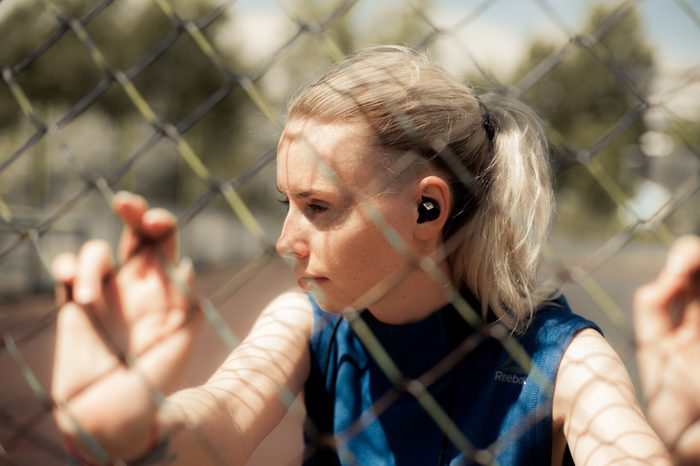
You’re coughing during cardio
Coughing and shortness of breath are the most common symptoms of exercise-induced asthma, or EIB (exercise-induced bronchoconstriction, or narrowing of the airways). But many people may not recognize that they’re coughing as a result of asthma. You may feel these symptoms a few minutes after starting exercise, or it could take 20-30 minutes. “Especially if somebody’s running, they may not feel it right away, but as the demands increase and they’re working harder, that’s when it kicks in,” says allergist Neeta Ogden, MD, a spokesperson for the American College of Allergy, Asthma, and Immunology. In extreme situations, you may be gasping for air. Here are more surprising asthma triggers you can smartly avoid.

Your chest and throat feel tight
Your chest may feel constricted like you can’t take deep breaths or get enough air into your lungs. Your throat could also tighten. If this happens, stop exercising and catch your breath. “Your whole body is working so much harder to get oxygen that it wouldn’t be recommended to take a break and then start exercising again without your medication on board,” Dr. Ogden says. Here are some other reasons you might have chest pain when running or exercising.

You live in a cold or dry environment
EIB occurs when you breathe in air that is drier and cooler than the rest of your body, which is what happens when you inhale through your mouth while exercising, explains Dr. Ogden. This type of air is a common trigger that makes your airways narrow. If the climate you live in is particularly cold or dry, your lungs are definitely more at risk.

Exercise leaves you exhausted instead of energized
Feeling exhausted while you exercise should be a red flag for exercise-induced asthma. Dr. Ogden warns, “People may not recognize that they’re short of breath and demanding more air from their bodies. They may call that fatigue.” Fatigue can be completely independent of symptoms in your airways, but you rarely feel fatigued without also experiencing respiratory problems. These are great ways to beat fatigue naturally.

It takes you a while to recover from a workout
If you have exercise-induced asthma, recovery times after exercise can range from 30 minutes to a full hour, depending on the severity of the condition, advises Dr. Ogden. Ask your doctor about getting a short-acting inhaler to use 15 minutes before exercising. If this doesn’t help, you may have regular asthma and need daily medication. Try these foods that can prevent asthma symptoms.

You blew that big competition
Off your game and don’t know why? EIB could be making you winded and affecting your athletic performance. The good news is, you can still play your favorite sports. Even Olympic athletes can compete with exercise-induced asthma. “It doesn’t have to ruin your life and your exercise,” Dr. Ogden says, “but until you get treatment, it can absolutely limit what you do and change your game.” Read how this woman keeps exercising despite her exercise-induced asthma.

You’re feeling out of shape when you shouldn’t
Even if you’re not a professional athlete, but are still healthy and active, exercise-induced asthma can make you feel sluggish. Dr. Ogden says it doesn’t have anything to do with your fitness level—anyone can develop the condition. “With the right treatment, you can still do any kind of exercise,” she says. “The reality is that it certainly has nothing to do with how physically fit you are.” Try these 26 ways to get in shape without working out.

You swim in a chlorinated pool
Generally, swimming is a great sport for people with exercise-induced asthma, because it still requires cardio demand, but the humid environment makes bronchoconstriction less likely. However, too much exposure to chlorine can irritate your respiratory tract. In fact, a study published in the journal Environmental Health found that early life exposure to swimming pools that contain chlorine was linked to early-onset asthma in children.

You live in a high-pollen area
Pollen and other respiratory irritants can cause bronchial constriction, closing your airways and leaving you with the unpleasant asthmatic symptoms that affect your work out, says Dr. Ogden. Having allergies, in general, puts you at risk, so be sure you know the triggers for your allergies. Working out in springtime—prime allergy season—can intensify asthma symptoms.

You struggle to run long distances
Do you enjoy going for 10-mile runs? That will change if you develop exercise-induced asthma. The deep breathing that running requires, plus the sheer distance, can decrease your endurance if your airways are constricted. “You’re not going to be able to run as long or as far,” Dr. Ogden says. “Your symptoms will kick in before the running’s over and you’ll find yourself struggling.” In that situation, meds or an inhaler can help you power through runs from a 5K to a marathon Here are some training tips for beginners who want to run a marathon. Regardless of your symptom or your environment, seeing an asthma and allergy specialist for an evaluation will set you on the road to relief.
